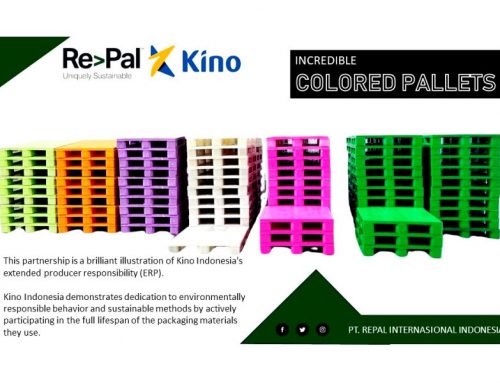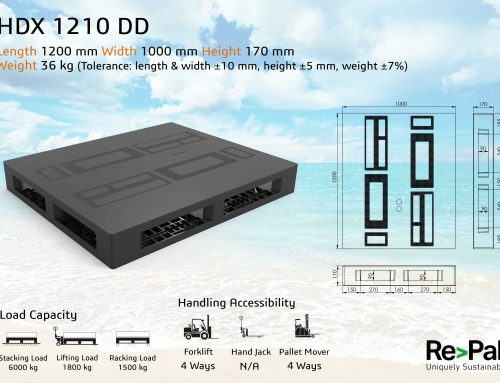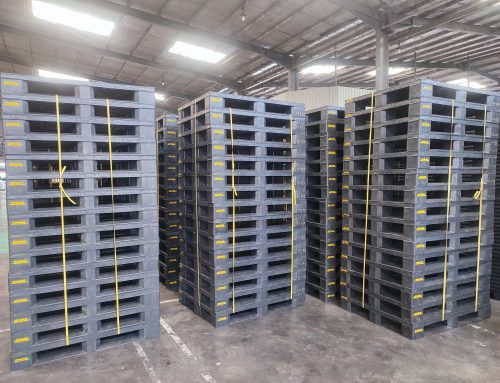If you’re in the manufacturing and logistics industries, you’ll understand the importance of pallets. They are a crucial part of any supply chain, so it pays to consider what type of pallet is best for all aspects of your business in the long-term. Pallets are made from a range of materials—most often, wood and plastic.
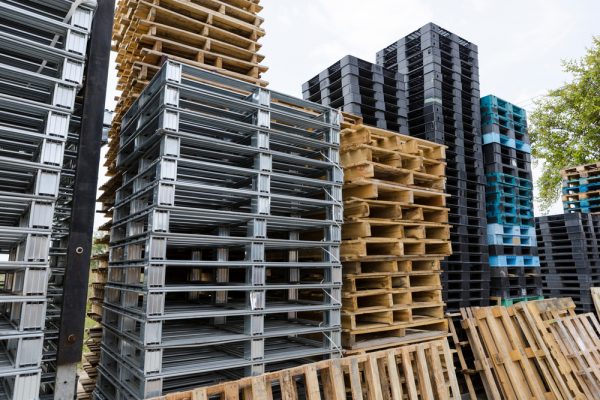
Image source: Shuttershock
While wood and plastic both come with advantages and disadvantages, recycled plastic pallets ultimately offer the best return on investment for business owners. In this article, we explain the main differences between plastic pallets vs wood pallets, and why many future-facing businesses are opting for the advantages of plastic pallets over wooden pallets.
| Table of Contents
The Disadvantages of Wood Pallets Do Plastic Pallets Have Any Disadvantages? |
The Disadvantages of Wood Pallets
For many years, wood pallets have been a staple of the supply chain. Even to this day, 90-95% of pallets in use are made of wood. They are well known as one of the cheapest materials, and have the benefit of being relatively easy to repair and recycle. On the other hand, wood pallets are heavier and need to be repaired and replaced regularly. One of the biggest issues in recycling isn’t the actual recycling of waste; it’s the capturing of waste in the first place. Wood pallets can also be difficult to clean due to their irregular surface, and carry a higher risk of infestation and contamination when damp. This is a particular issue for the food industry, as well as the pharmaceutical industry.
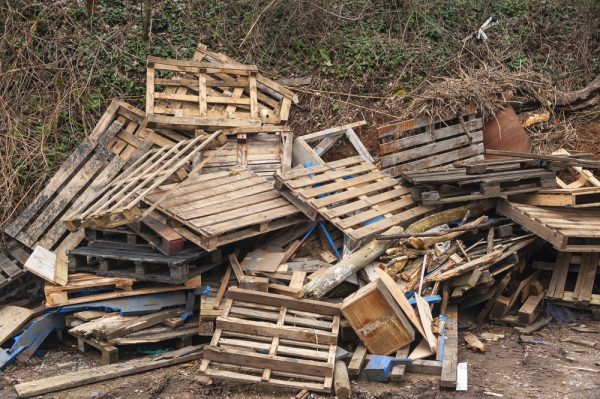
Image source: Shuttershock
Why Use Plastic Pallets?
Plastic pallets have a number of benefits, which we will explain in the seven reasons below.
1.Plastic pallets are easier to transport
Plastic is durable than wood, and is less likely to break down on repeated trips. Plastic pallets are also ideal for carrying heavy cargo during shipping, and being moved around via forklift in a warehouse. Furthermore, plastic pallets are more able to withstand harsher weather elements in transit compared to wood pallets.
2.Plastic pallets are cost effective
As plastic pallets tend to be lighter than wooden units, freight rates are generally lower whether you’re transporting goods by road, sea or air. Although plastic pallets often have a higher upfront cost, the cost per trip for plastic pallets is often significantly lower due to their durability. In recent years, new breakthroughs in technology have lowered the costs of plastic pallets even more in comparison to wood pallets.
3. Plastic pallets are hygienic
As plastic pallets do not absorb moisture, common issues with wood pallets such as rot, infestation, fumigation and odour absorption are no longer a concern. Thus, the smooth surface of plastic pallets can be easily and thoroughly cleaned between uses. Plastic pallets are perfect for industries with regulatory and hygiene requirements such as pharmaceutical and food and beverage.
4.Plastic pallets are safer for everyone
Plastic pallets do not have weak spots at certain points, unlike wood pallets. This is due to the way plastic pallets are constructed: in one solid piece. This results in lower risks of units failing under a heavy load. Choosing plastic pallets over wood pallets eliminates nails, splinters and broken boards. This means that your valuable goods are less likely to be damaged and your employees have a safer working environment.
5. Plastic pallets take up less space
A big advantage plastic pallets have over wood pallets is their nestability. Nestable pallets often feature a nine-leg bottom which nests into other pallets, saving precious space in a warehouse.
6. Plastic pallets are more flexible and versatile
Plastic pallets are made in a range of different designs, and can be used to suit a range of environments and purposes. Whether most of your operations take place in the warehouse or in export, plastic pallets, in being more malleable and sturdy, can be made to suit the specific needs of particular industries.
7. Plastic pallets have a longer lifespan than wood pallets
If you’re weighing up plastic pallets vs wood pallets, it’s a good idea to consider what you’ll be using them for. If you’re regularly shipping items or using pallets in a warehouse, it makes sense to invest in pallets designed for longevity. Time and time again, plastic pallets can be used without much wear and tear. This combats the throwaway culture which contributes to climate change, and puts your business on the right side of history as you do your bit and take waste out of the ecosystem rather than adding to it.
Do Plastic Pallets Have Any Disadvantages?
With the downsides of wood pallets in mind, let’s explore the alternatives. In recent years, pallets have been made from an increasing range of materials. These materials range from plastic to metal, to even cardboard. Of all of these materials, plastic pallets are in the running as the fastest growing pallet choice for many supply chain managers. Plastic pallets offer many benefits but, like with everything, come with advantages and disadvantages. The outstanding factor for many businesses is the higher upfront cost of plastic pallets. Arguably, however, plastic pallets are the cheaper choice when the entire lifecycle is considered, as plastic pallets generally last longer.

In addition to this, the acquisition cost of wood pallets has also skyrocketed during COVID-19 as more and more shoppers have moved online, and the consequent demand from suppliers for pallets.
Choosing the most sustainable option: recycled plastic
After weighing up the benefits of plastic vs wood pallets, it’s always a good idea to explore your options to the fullest. As plastic pallets become increasingly common, many people may ask – is plastic the most environmentally friendly option? Re-Pal provides an answer to this. Being made from 100% recycled plastic, you can enjoy the many benefits of plastic pallets without worrying about adding more plastic to the environment.
Many modern multi-nationals are now moving away from wood pallets as they look to make their supply chains more sustainable – even more so in light of the 2030 Sustainable Development goals.
Plastic pallets are more environmentally friendly compared to wood pallets; choosing a plastic pallet over wood reduces deforestation. With global deforestation occurring at a rate of four football fields per minute, it’s not enough for pallets to be recyclable like wood. In fact, businesses using unsustainable wood pallets are actually contributing to the denigration of our environment. Pallets made of recycled plastic further promote a circular plastic economy where waste is reduced instead of produced.
How Are Our Recycled Plastic Pallets Made?
They’re made using an advanced process called ThermoFusion™. With ThermoFusion™, Re>Pal takes a unique approach to managing mixed plastic waste, by turning it into something new – a structurally strong product. In the manufacturing process, minimal energy is used compared to the manufacture of virgin plastic pallets.

- Mixed plastic waste is salvaged, with added cost of grading and sorting.
- ThermoFusion™ processing turns the waste into a malleable dough.
- Compression molding creates our finished Re>Pal pallets, forming an innovative and sustainable solution to waste plastic which would otherwise be polluting our land and waterways.
Set an industry standard
If you’re a future facing company or a logistics manager looking to improve the supply chain, you can achieve your zero waste goals with Re>Pal. Move competitively into the future and offset your carbon footprint, with no compromise on quality or profit. Re>Pal supplies its superior pallets to many global and domestic suppliers including Unilever, IndoFood, Nestle and IFF. You can read more about businesses that have successfully integrated our recycled pallets here.
Plastic Pallets vs Wood Pallets: Which Should I Use?
Although plastic pallets offer numerous benefits over wooden pallets, the choice to use either ultimately depends on the purpose of the pallet. If the pallet is used to ship goods overseas with a low chance of return, the lightest and lowest cost alternative would be ideal. However, if the purpose of the pallet is to be reused for multiple trips to the same stores or in your warehouse, a durable alternative is the more economical choice.
Re>Pal makes this decision easy with pallets designed to fulfill different needs. Our lightweight nestable and stackable pallets are perfect for exports, while our rackable and heavy duty pallets can be ideal where long term durability is of essence. View our pallet product range here.
Which issues are you dealing with? Try Re>Pal plastic pallets
If you’re still comparing plastic pallets vs wood pallets, consider this: wood pallets are inherently wasteful, inefficient and high risk. Re-Pal supports a circular economy, collecting waste with no value and repurposing it to add value. Businesses using Re-Pal can further contribute to a sustainable economy by taking advantage of the take-back system for end of life pallets. There is no make, use, throw away – only reclaim, reuse and reinvent. With Re-Pal, a plastic pallet is made to be mixed in with other waste.

In the main, wood pallets are no longer the best option for businesses looking to move into the future. If you’d like to see the benefits yourself, recycled pallets can be a cost-effective and environmentally friendly alternative for any supply chain. Contact us or have a look at our product range today.


